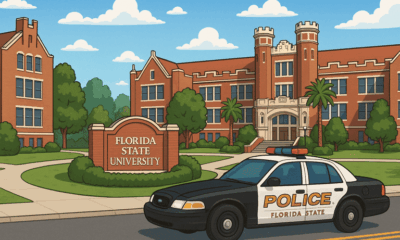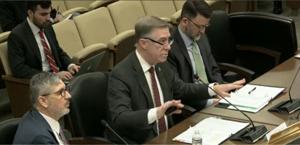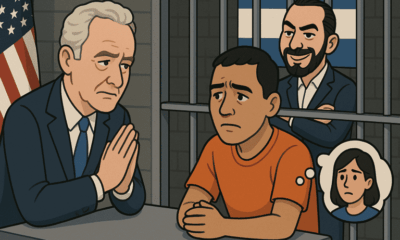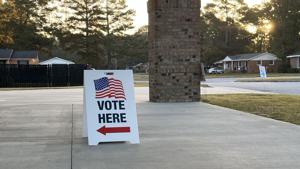virginiamercury.com – Charlotte Rene Woods – 2025-02-21 16:08:00
UVa Health to continue transgender care for now, new patients will be directed elsewhere
by Charlotte Rene Woods, Virginia Mercury
February 21, 2025
The University of Virginia’s hospital will continue to provide gender-affirming care for existing patients, but new patients will have to seek treatment elsewhere. In a closely watched meeting Friday, the UVa Board of Visitors approved a resolution limiting access, adding another layer of uncertainty for transgender youth and their families.
The decision comes after an executive order from President Donald Trump led UVa Health and other hospitals to temporarily pause gender-affirming care for patients under 19. Though federal judges in Baltimore and Seattle have since blocked the order, the legal battle is far from over as appeals loom.
In response, UVa’s queer student union and other advocacy groups gathered at the university’s rotunda Friday to protest the board’s decision. Demonstrators moved closer to the meeting room in an effort to ensure their voices were literally heard during the deliberations.
Elisabeth Doty, a UVa student, was among the dozens to show up.
“I’m relieved for the trans patients that are able to continue care, but obviously, it’s extremely disappointing to hear that new patients won’t be able to get care,” she said following the closed-door decision.
Support for trans communities at UVa also came from beyond the protest. More than 1,000 people signed a petition urging continued care, while faculty and staff issued a joint letter, and several lawmakers sent one as well.
Sen. Danica Roem, D-Prince William, and Mark Levine, a former Democratic delegate from Alexandria, cautioned that limiting access to such care could violate federal and state law.
“When the law is clear, even the highest executive official must obey it,” they wrote in a joint statement. “Similarly, the Board of Visitors likewise has no power to make laws or to disregard them.”
Roem, Virginia’s first openly transgender lawmaker, and Levine, one of the first openly gay state legislators, have long been vocal on LGBTQ+ rights. Roem said she has heard directly from families who have “been made to panic for weeks” amid policy shifts from state Republicans, including Gov. Glenn Youngkin, and Trump.
Roem believes these actions — ranging from bans on gender-affirming care and restrictions on trans student athletes to the removal of transgender history and resources from government websites — are part of a broader effort to “eradicate” transgender identities.
“(Republicans) mean for trans people in general, to not be recognized by the federal government for who we are, and to say that our lives are lies,” she said.
For students like Doti, the impact is inescapable. She pointed to Missouri, where the state’s attorney general fought to obtain medical records of transgender minors and lawmakers passed a ban on gender-affirming care for minors.
“These policies sort of follow you wherever you go,” Doty said.
Meanwhile, Youngkin took to social media Friday to celebrate UVa’s decision to stop accepting new transgender patients under 19, stating that “common sense and medical ethics have prevailed.”
VCU Health doctors sort out ‘how best to help these children’
While VCU Health’s administration has yet to change its stance on resuming gender-affirming care, some of its medical staff are already preparing for the potential mental health repercussions of the ongoing pause.
Emails obtained through a Freedom of Information Act (FOIA) request by Roem that she shared with The Mercury reveal doctors organizing meetings to prepare for an anticipated increase in emergency department visits and mental health crises stemming from the disruption in care.
“I know many of us are anticipating a large spike in children who are in acute mental health crises,” wrote Dr. Frank Petruzella, division chief of emergency pediatric medicine, in an email sent shortly after Trump’s order.
He urged colleagues to meet within days to assess the scope of at-risk patients and to develop a contingency plan for treating those affected.
“I think we should try to get this group together in the next few days to try to get an idea of the potential scope of patients at risk, as well as to develop a contingency plan for how best to help these children,” he wrote.
Petruzella also warned that some cases could be so severe that discharging patients to their home could be unsafe, and that medical staff should prepare for a surge in consultation calls seeking guidance.
With transgender youth already at higher risk for self harm or suicidal ideation, ongoing restrictions on gender-affirming care have left families in panic mode, Roem said.
She has heard directly from parents of transgender children, many of whom are struggling with uncertainty as Trump administration policies continue to target trans identities.
Despite the turmoil, Roem said she found the correspondence between VCU Health doctors, obtained through her FOIA request, to be a rare moment of encouragement.
“That was a kids-first statement,” she said.
While UVa Health has resumed gender affirming care, both VCU Health and Children’s Hospital of the Kings Daughters (CHKD) have yet to restore services. A spokesperson for VCU Health did not respond before publication to confirm whether its policies had changed, and the hospital has not made an announcement.
Even as UVa moved forward, concerns about financial and legal risk loomed. The resolution adopted by the UVa’s Board of Visitors explicitly noted that the hospital could be in jeopardy of losing federal funding, stating that there “remains significant legal uncertainty and institutional risk.”
Though Trump’s executive order is currently blocked by federal judges, the legal battle isn’t over — appeals are likely on the horizon. If reinstated, the order would t direct the federal government to impose regulations restricting transgender health care, with a focus on Medicare and Medicaid conditions of participants and coverage.
Beyond affecting individual health insurance access, these policies could have sweeping financial consequences for hospitals nationwide, many of which rely on Medicaid and Medicare funding to support operations.
For UVa student Doty, recent weeks have been a stark reminder of the ongoing struggle for transgender rights. “It sometimes feels like we love our community more than (the country) loves us back,” she said. But I also think that I have seen solidarity in ways that I’ve never seen before.”
GET THE MORNING HEADLINES.
SUBSCRIBE
Virginia Mercury is part of States Newsroom, a nonprofit news network supported by grants and a coalition of donors as a 501c(3) public charity. Virginia Mercury maintains editorial independence. Contact Editor Samantha Willis for questions: info@virginiamercury.com.
The post UVa Health to continue transgender care for now, new patients will be directed elsewhere appeared first on virginiamercury.com

















































